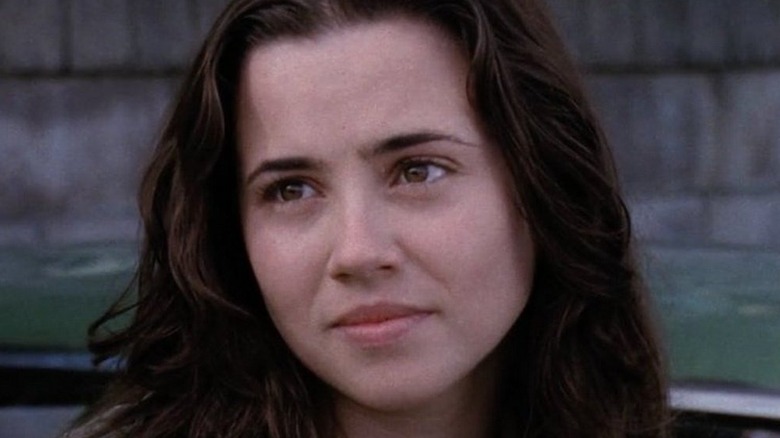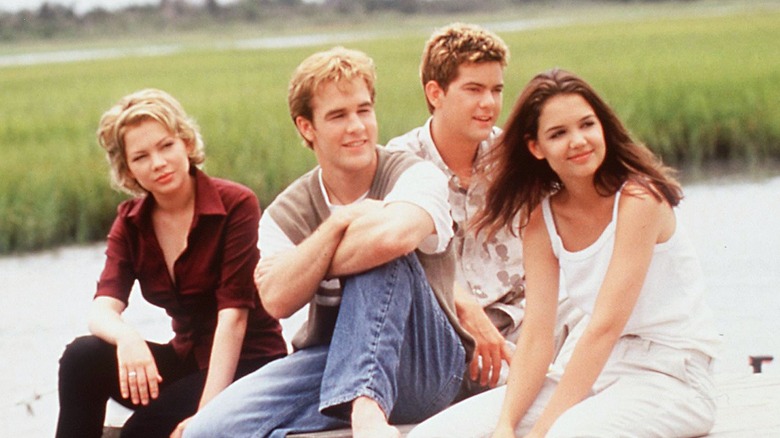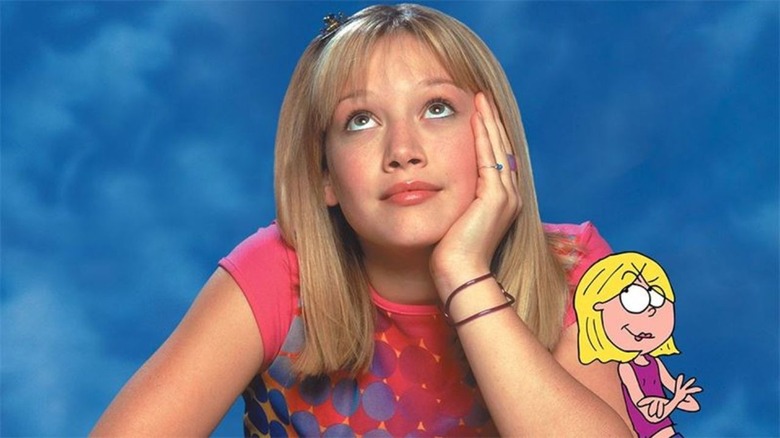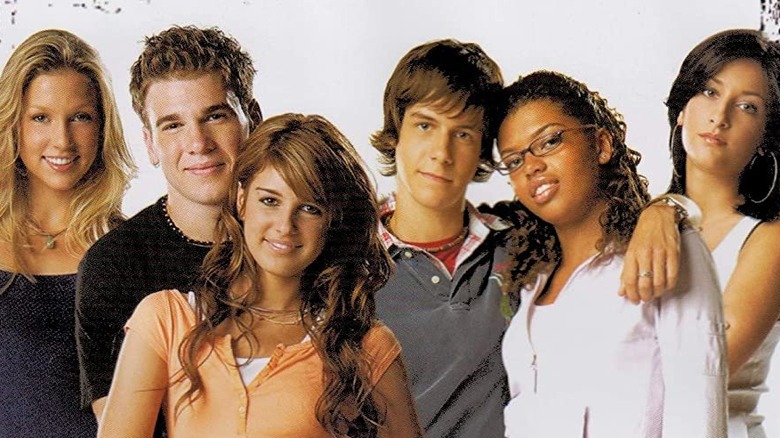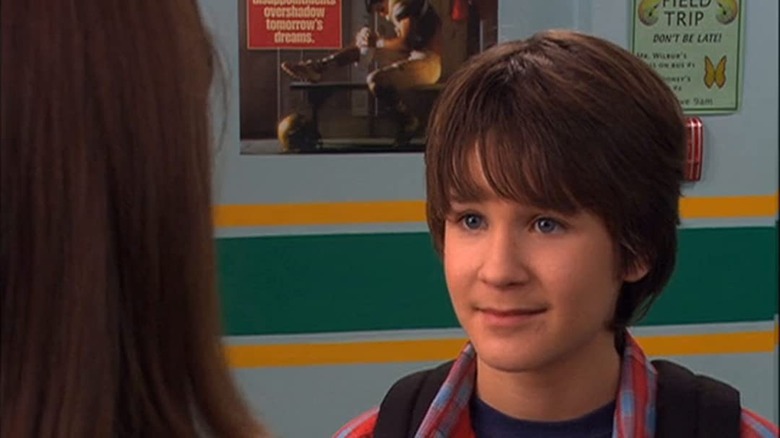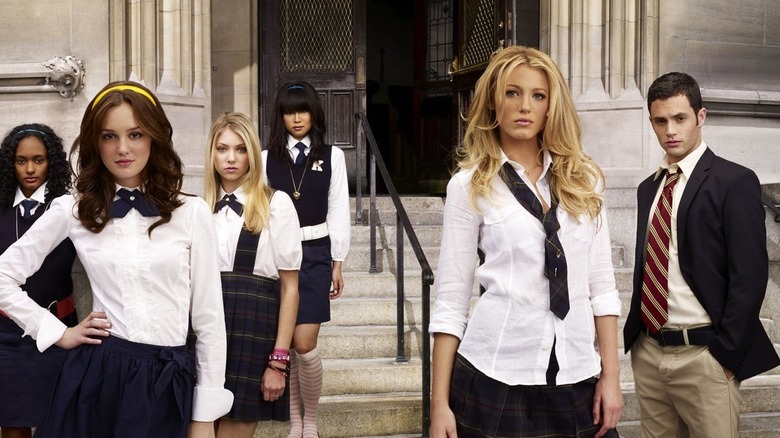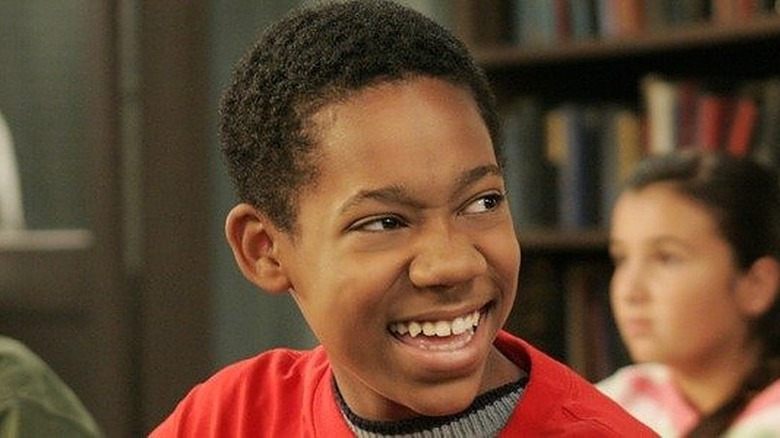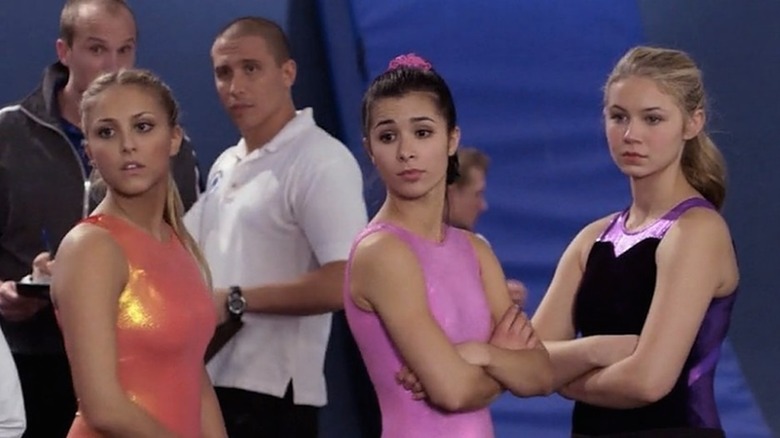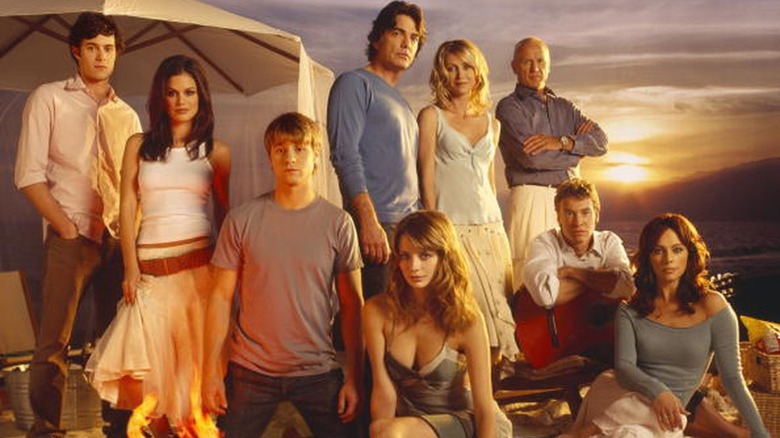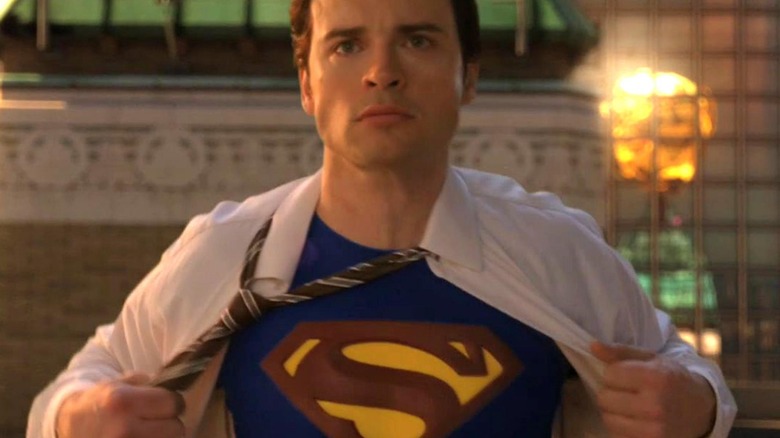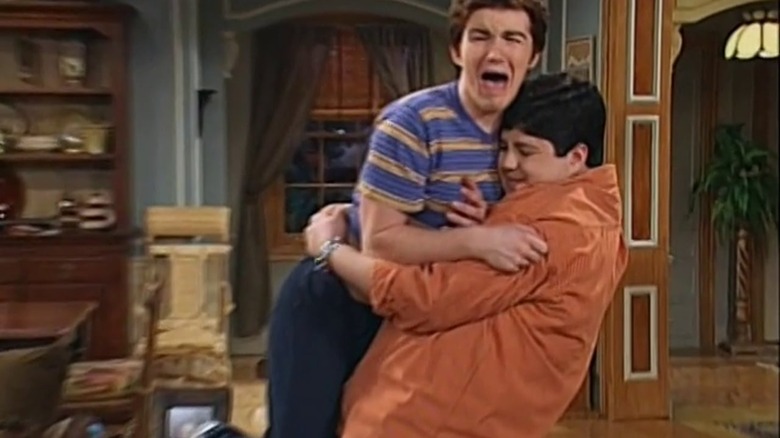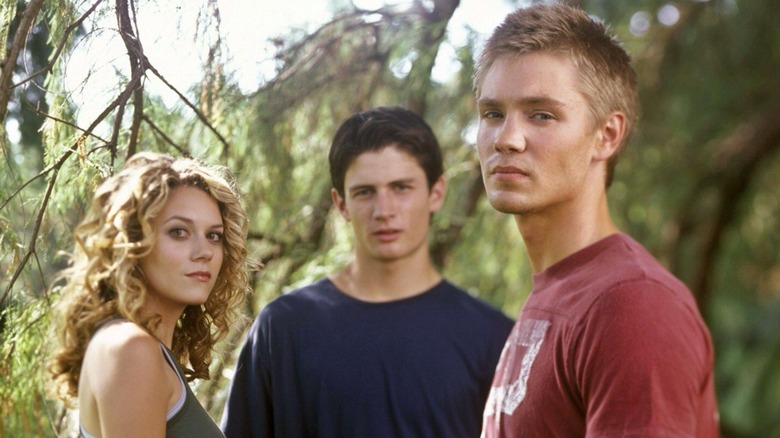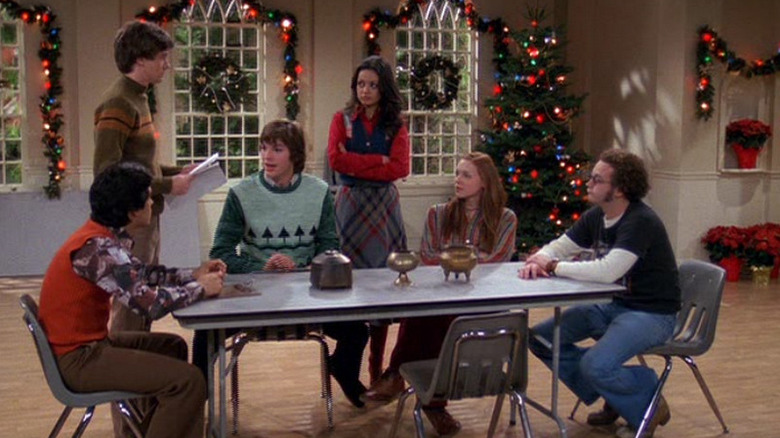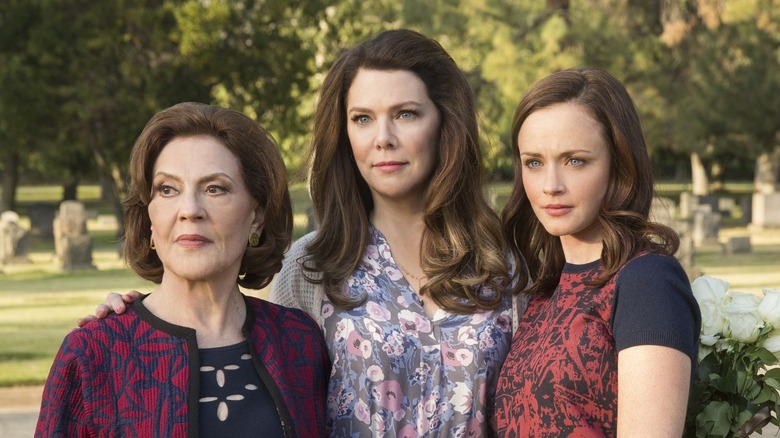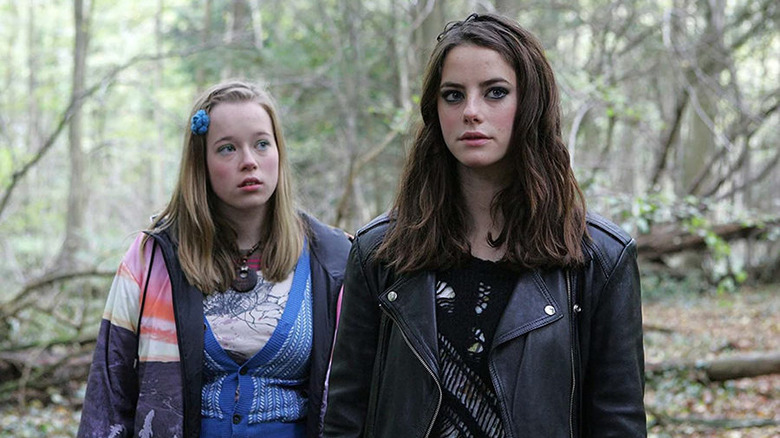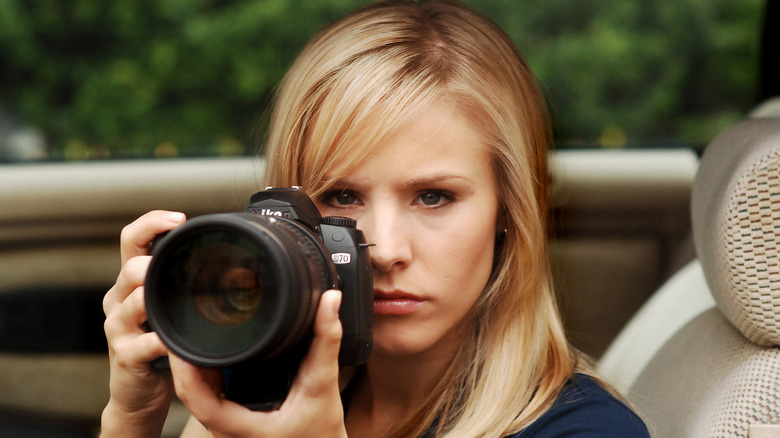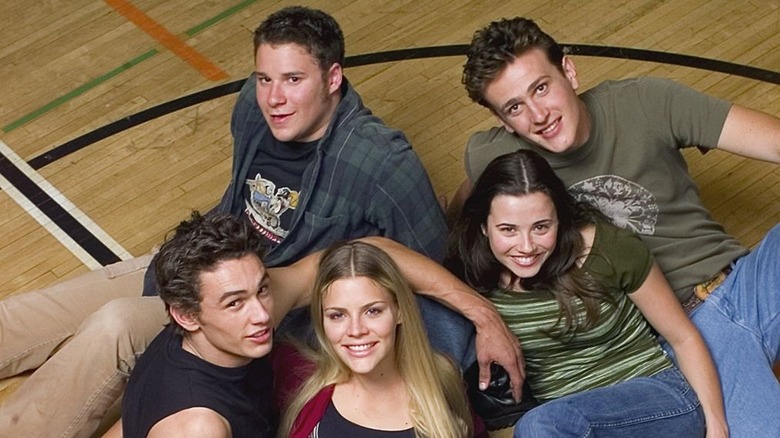The Best Teen TV Shows From The '00s
For people who were teens in the 2000s, they might seem like yesterday — especially since it can be hard to accept that the decades are widening between us and our youth. For many people, and for many reasons, the 2000s were a defining decade in our lives. National and international crises, from financial meltdowns to terrorism, changed the way that we saw the world and shaped how we would begin to engage with it as young adults.
At the same time, the 2000s began what has been defined as the "new" Golden Age of Television, a reference to the period of the same name in the 1950s. The world was changing rapidly, but the small screen made us feel like things were moving in the right direction.
The wide variety of critically-acclaimed shows on television was characteristic of this era, and means that teens in the 2000s were extremely fortunate to have the selection they did: Here are the best of the best.
Dawson's Creek
Though it's markedly lower-rated (6.6/10 on IMDb) than most of the other titles here, no list of 2000s teen TV shows would be complete without the indispensable "Dawson's Creek." Like most teen dramas of the era, it revolves around a tight-knit group of friends. But unlike many teen sitcoms in which the characters seem to remain the same age, stuck in limbo somewhere around 10th grade for far longer than you would spend at that level in the real world, this series followed them through high school and into college.
"Dawson's Creek" was created by somebody who really understood the absurdity of adolescence as the part horror, part comedy it is: Kevin Williamson, who wrote the script for the iconic "meta" slasher "Scream." As the new millennium began, TV also entered a new age — or, as EW put it in 2007, a canon of "New TV Classics" was beginning to form. "Dawson's Creek" was ranked among them. It also helped to popularize young actors, like Katie Holmes and Michelle Williams in particular, who would become cultural sensations in the years to follow.
Lizzie McGuire
Maybe we haven't seen Hilary Duff as much lately, but in the 2000s, it seemed like she was everywhere. As "Lizzie McGuire," she embodied such a successful and beloved character that she got her own movie spin-off, and there was even a reboot filmed over a decade later. (It turned up dead in the water after creator and showrunner Terri Minsky departed the project — even after a few episodes had already been filmed!)
Still, the fact that a revival was put together at all is a testament to how beloved the show was, and remains, among its fans. Critics loved it, too: While audiences on IMDb gave the show a 6.6/10 just like "Dawson's Creek," it scored an impressive 100% on Rotten Tomatoes. The series is defined by Duff's character's efforts to navigate the dilemmas of her teenage years with the help of an animated version of herself, also voiced by Duff, whose little monologues express Lizzie's inner world.
It's a creative way to get inside the mind of a teen, and a uniquely 2000s artifact.
Degrassi
The Canadian TV series "Degrassi" was so popular that it has spawned numerous sequels and spin-offs throughout the 2000s and the following decades. In fact, the term "Degrassi" really refers to five separate television shows, spanning from "The Kids of Degrassi Street" in 1979 to "Degrassi: Next Class," which concluded in 2017.
But "Degrassi" was also the name taken up by the fourth series in the franchise, whose extended moniker is "Degrassi: The Next Generation," and which ran for 14 seasons beginning in 2001 (the "Next Generation" subtitle was dropped in Season 10). By the time the series arrived in the 2000s, the characters were dealing with some pretty heavy themes.
A lot of teen TV is more lighthearted, but it was a big deal for the 2000s teen generation to see the reality of their lives portrayed on screen. Like many of the shows of the era, the show has been successful with audiences (7.4 on IMDb) both in its time and since.
Ned's Declassified School Survival Guide
Many of us would likely say that our favorite teen TV series helped us survive. They made us laugh when we wanted to cry through our first breakup, made us feel understood when we felt like no one would ever really get us, and gave us a family when we felt truly alone. But "Ned's Declassified School Survival Guide" takes the fight for teenage survival even further: The titular main character takes us through exactly what we need to do to get through some of the hardest, most painful, most awkward moments of our teen years.
The episodes are unique because each one is devoted to a tip or topic from Ned's "guide," but they also serve to develop certain plot throughlines, like romantic stories. The comedy is a bit goofy and slapstick, turning an endearing lens on a chapter of human growth and development that doesn't always go so smoothly. "Ned's Declassified" was rated a 7.4 by fans on IMDb, the same as "Degrassi" but with a greater "voter turnout."
Gossip Girl
Another show that people liked so much that it eventually got a reboot, "Gossip Girl" was the perfect exemplification of teenage girl drama. Of course, not all of its viewers could relate to the affluent socialite status enjoyed by the main characters, but that was really part of the appeal. The privilege of the upper-class teenage protagonists carried a certain allure for the young audiences in 2007, especially those who had read the books the series was based on.
The issues faced by the main characters might seem a bit foreign, or even trivial, to those of us who didn't grow up wealthy on Manhattan's Upper East Side. Being the "it girl," pursuing wealth and status, fighting with frenemies over the same guy by taking out aggression in field hockey practice. "Gossip Girl" gives us a window into a rarefied echelon of society through the eyes of an anonymous, and seemingly all-knowing, blogger for whom the show is named. There's enough well-executed drama to earn the show a 7.4 on IMDb and an 84% on Rotten Tomatoes.
Everybody Hates Chris
Everybody may hate Chris, but they loved his show. The title "Everybody Hates Chris" is a parody of the popular adult sitcom "Everybody Loves Raymond," which preceded it by a few years. In fact, there was something of a direct handoff between the two shows: "Raymond" ended in 2005, the same year "Everybody Hates Chris" began.
"Everybody Hates Chris" began airing on the now-defunct UPN network, but only for its first season, before it — and a number of other shows from The WB — was moved to The CW. The series follows a young African-American teenager living in the city, and is based on the experiences Chris Rock, who narrates the show, had during his own teenage years.
The critically-acclaimed series is relentlessly witty, wry, and raw in its treatment of American life through the eyes of a teenager, especially where race and class are concerned. This perspective was rarely seen on television at the time — yet was so well-executed, without sacrificing comedy, that the series earned a 95% on Rotten Tomatoes.
Make It Or Break It
We have a lot of dreams as teenagers, and most of them don't come to fruition because we're too busy trying to make our grades and prepare for adult life instead. But the teen gymnasts on "Make It Or Break It" are in the midst of pursuing one of the loftiest dreams of all: competing in the Olympic Games.
Whereas a lot of the stakes in teen dramas can literally seem a little juvenile – serious as they may feel to the characters themselves and to the fans who are invested in their lives — there is an ever-present threat of physical danger in the lives of the "Make It Or Break It" characters.
The challenges faced by the characters, and the bonds and competition between them, have much wider implications: They are attempting to compete on a globally recognized stage, as opposed to vying for prom queen or class president. Of course, the cattiness and drama of the teen years are still ever-present despite elevated stakes, and the balance means that the critically well-received (80% on Rotten Tomatoes) show has also garnered a considerable cult following over the years as well.
The O.C.
Oh, to be a teen of means. That's probably a common refrain among fans of 2000s teen television shows. Many times, like in "Gossip Girl" or in another popular series of the era, "The O.C.," the protagonists have a degree of wealth and privilege that isn't necessarily accessible to the majority of their audience.
It's so dreamy, for example, to watch the "girl-next-door" character from "The O.C.," Marissa, meandering through a party in an Orange County mini-mansion. The power dynamics and social expectations make everything seem so intense, as if teen life isn't already that way. There are the typical issues of family dysfunction and alienation that many teenagers face, side-by-side with more hardcore tensions like drug use and even, eventually, death.
Unfortunately, "The O.C." started out hot (literally: a house catches on fire in the first episode) and lost its spark as the seasons went on. Still, for devoted fans who fell in love with the troubled teens of Orange County and gave it a 7.5 on IMDb, the flame never truly went out (even in the shocking crash that killed a main character at the end of the third season).
Smallville
Finally, a show about a normal teenage kid who comes from a down-to-earth farming family and just wants to get a date with his crush (but always seems embarrassingly thrown off by her mesmerizing green necklace). Wait, what's this? To give you a hint, it's not a bird or a plane. And it's not quite Superman, either: It's Clark Kent discovering his identity and becoming the Man of Steel over 10 wonderful seasons of character development that have earned a 7.5 on IMDb with a whopping 113,000 ratings.
In "Smallville," we get to see Clark coming to terms with his powers, which develop in an awkward and unwieldy way that mirrors human puberty. As he learns to navigate his identity, he grows in his relationships with his foster parents, his friends and love interests, and himself. (He's even friends with Lex Luthor for a bit!) It's fascinating to see the humble beginnings that birthed the world's most recognizable superhero, and "Smallville" is rich with the everyday drama of being a human teenager in addition to the pressure of, you know, saving the world.
Drake and Josh
About 37,000 fans, ever since "Drake and Josh" began airing in 2004, have taken to IMDb to offer their thoughts on the classic teen sitcom from Nickelodeon (and those thoughts are, at 7.7/10, quite favorable). The show indirectly birthed the next generation of Dan Schneider teen shows on the network: You'll recognize Miranda Cosgrove, who plays the lead character in "iCarly," from her earlier appearance on "Drake and Josh" as Drake's biological younger sister Megan, notorious for her sarcasm and propensity for creating mischief.
The series follows a somewhat non-traditional family, in which two stepbrothers of completely opposite personalities find themselves forced to live together in probably the most complicated time of their lives: the teen years. But while the problems inherent to being a teenager are potentially comedic enough, the real meat of the show is in the relationship between the brothers, who act as perfect foils for each other and in whom almost every viewer can find a piece of themselves.
One Tree Hill
A lot of these throwbacks make us feel pretty old, but "One Tree Hill" does so especially because it premiered in 2003 on a network that doesn't even exist anymore. The WB (Warner Bros. Television Network) became defunct in 2006, after which some of its content moved over to The CW — including "One Tree Hill."
The series is a showcase of small town life in Tree Hill and the unique challenges presented by growing up in that environment. There is always drama in high school, but adding a pair of half-brothers into the mix who compete romantically, socially, and athletically makes a small world that much smaller — both more close-knit and closer to the end of the fuse.
"One Tree Hill" has become a cultural phenomenon in the years since it began airing, and fans are incredibly loyal: they came out by the tens of thousands to lift the show to a 7.7. on IMDb, and new generations are discovering this classic every day.
That '70s Show
Unlike most of the other popular teen series of the 2000s, "That '70s Show" wasn't set in contemporary times. While it began airing in 1998 and concluded in 2006, the period sitcom depicted the lives of a group of high school students and their families in (if you couldn't guess from the title) the 1970s.
The transitions are full of groovy psychedelic visuals and the costumes and sets are delightfully period-appropriate: bell-bottoms and tie-dye, scarves and headbands. Couches in the basement. The characters are sort of trope-y, especially the parents. The Forman parents are a cheerful but overworked mother and an emotionally distant father with traditional ideas about masculinity. The Pinciotti parents are a ditzy, youthful woman all the guys have crushes on, and a jovial, insufferable, but well-meaning metrosexual man.
For all the over-characterization, though, the characters' motivations and relationships are developed pretty deeply over the course of eight hilarious, 8/10 (according to IMDb) seasons.
Gilmore Girls
The 2000s literally kicked off with "Gilmore Girls," which premiered in the first year of the decade and quickly became a staple of television viewing. Like "One Tree Hill," it also started out on The WB, but completed most of its run, with the exception of the final season, before the surviving WB content transitioned to The CW.
While The WB was active, "Gilmore Girls" was one of its most popular shows, but its legacy transcended that of a teen or family sitcom: It has been named on multiple reputable lists of the greatest TV series of all time and is a veritable American classic, holding an 8.1 on IMDb and an 85% approval rating on Rotten Tomatoes. The relationship between thirty-something mother Lorelai (Lauren Graham) and her intelligent teen daughter, Rory (Alexis Bledel), forms the heart of the narrative that has captured fans of multiple generations.
"Gilmore Girls" has been so successful in part because it has two protagonists from separate demographics, and while their close relationship is heartwarming, it is non-traditional and not without its trials. Lorelai herself has had to raise not only her daughter, but herself, as a result of being ostracized from her family — and reinvent what family means altogether.
Skins (British version)
If you're looking for drama onscreen and off, you can't do much better (or worse) than the original British version of "Skins," which premiered in 2007. It quickly became known for its controversial storylines centering around somewhat taboo topics (especially for 2000s television), including serious mental illnesses like bipolar disorder and eating disorders, as well as family dysfunction, sexuality, and death.
It's pretty heavy for a teen show, but the series has a considerable cult following on both sides of the pond and beyond. Audiences love it: It has scored an 8.2 on IMDb and captured the hearts, minds, and memes of 2000s teenagers and more in the ensuing decades.
Investment in the characters is easy and immediate: Each of the episodes takes a deep dive into the life, mind, and personal struggles of one of the characters or a small group of them. Through their eyes, we get a look at some of the hardest-to-talk-about topics not just for teens, but for all of our culture. "Skins" not only kept people engaged, but helped them feel less alone.
Veronica Mars
Did you read the "Nancy Drew" or "Hardy Boys" novels as a kid? Did you wish that they would be adapted for the screen at a higher level than the occasional one-off film? "Veronica Mars" is the answer to every youth sleuth's desires: The daughter of a disgraced former sheriff becomes a private investigator with a gruff and lovable canine sidekick.
Veronica Mars is the sarcastic, spunky, and self-sufficient social outcast who you convince yourself that you'd be friends and join forces with if only you went to the same school. She was once a part of the popular and wealthy crowd solely by virtue of dating one of them and being best friends with his sister. The latter's murder not only threw off the social organization of Veronica's high school life, but rocked the town to its foundation.
Veronica holds her own against police officers, rich sociopaths with shady connections, gang members, and mean girls. The show is every bit deserving of its 8.3 on IMDb and its stellar 92% on Rotten Tomatoes. It gained such a cult following, in fact, that it earned a reboot over a decade after it first aired.
Freaks and Geeks
It's the best teen TV show from the 2000s, if you ask IMDb audiences, who scored it an 8.8/10, or 100% of Rotten Tomatoes critics. It has become a cult classic and beloved by almost everyone who has laid eyes on it (and for those who haven't discovered it yet, we offer condolences). So why did it end after a truncated first season in which only 12 of the originally scheduled 18 episodes aired?
Well, that's a matter for another time, but there was apparently more drama behind the scenes of "Freaks and Geeks" than between the clique-y cafeteria tables in American high schools. As evident by how much of a following it has generated since, "Freaks and Geeks" was ahead of its time — but creator Judd Apatow has kept the nostalgia alive by including some of the actors in his work ever since, a homage to the distinct piece of art they created together and the incredibly unique characters they brought to life.
Many of these big-name actors' careers were launched or buoyed by the show — James Franco, Seth Rogen, and Jason Segel, for example. These household names owe a lot to a show that was itself an exercise in radically altering and molding your own image.
